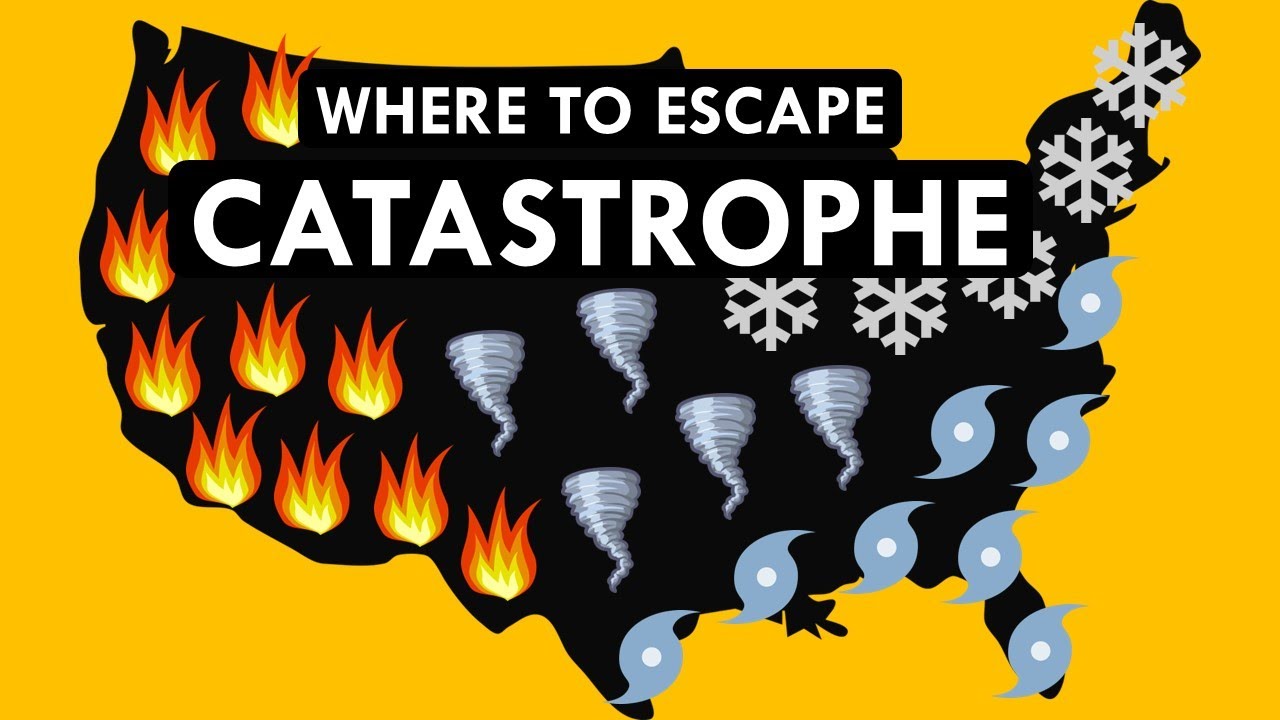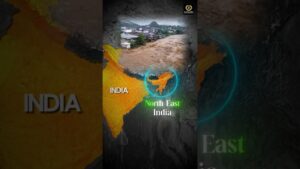
Since I started making videos about affordable walkability and underrated urbanism, I’ve gotten several requests to do something specifically around small and mid-sized cities. Well, this video isn’t EXACTLY that, but it’s adjacent!
It turns out, if my brazen misapplication of the EPA’s Climate Resilience Screening Index is to be believed, small and mid-sized cities are going to be pretty good performers under trying climate conditions. So, if you were to pack up all your stuff and move to a place that had the least risk / most resilience, and was STILL a legitimate city, what city would it be? Well, this video has ten ideas for you. Ignore them at your peril!
———-
CityNerd is now available on Nebula — streaming ad-free, along with lots of other great creators! Discount for signing up at my channel:
https://nebula.tv/citynerd
———-
Patreon – a way to directly support continuing CityNerd output! Thanks to all who have signed up so far.
https://www.patreon.com/CityNerd
———-
Instagram: @nerd4cities
Mastodon: @nerd4cities@mstdn.social
Twitter: @nerd4cities
———-
Previous CityNerd Videos Referenced:
– Affordable Walkability: https://youtu.be/QcPaxCTZpfM
– Intercity Rail: https://youtu.be/4miYK7m2-JU
– Undervalued US Cities: https://youtu.be/1qzePci2N6E
———-
Resources:
– https://nepis.epa.gov/Exe/ZyPDF.cgi?Dockey=P100SSN6.txt
– https://www.cbsnews.com/news/18-wildfires-burning-across-oregon-washington-force-evacuations-thousands-without-power/
– https://www.opb.org/article/2022/05/10/oregon-governor-primary-wildfires-fire-prevention/
– https://www.oregonlive.com/environment/2022/08/tough-tradeoffs-for-victims-of-oregons-historic-wildfires-to-rebuild-or-leave.html
– https://www.oregonbusiness.com/article/transportation/item/19656-wildfire-season-slams-southern-oregon-s-tourist-economy
– https://www.theguardian.com/us-news/2022/oct/20/seattle-portland-air-quality-wildfire-smoke
– https://www.wweek.com/news/environment/2022/09/09/portland-air-quality-deteriorates-as-east-wind-carries-in-wildfire-smoke/
– https://www.opb.org/article/2022/09/12/oregon-wildfires-causing-unhealthy-air-quality/
– https://www.opb.org/article/2022/09/28/pacific-northwest-heat-wave-2021-oregon-summer-weather-heat-dome-climate-change/
– https://www.oregonlive.com/news/2023/02/forecasters-predicted-a-trace-of-snow-then-portland-set-an-80-year-record-what-went-wrong.html
– https://www.dallasnews.com/news/weather/2021/02/16/thousands-still-without-power-as-north-texas-reaches-record-low-temperature/
– https://www.uppermichiganssource.com/2023/02/27/study-back-to-back-hurricanes-likely-come-more-often/
– https://www.politico.com/states/california/story/2021/08/06/dixie-fire-becomes-largest-single-wildfire-in-california-history-1389651
– https://hagadonemarine.com/top-5-places-jet-ski-lake-coeur-dalene/
– https://www.zillow.com/home-values/50962/bend-or/
———-
Images
– USA – California Wildfires – Deadly fire in rural Northern California / California wildfire leaves swathe of devastation in Keswick / Twin Northern California fires threaten 12,000 homes / California Wildfires Seen from Space / Smoke from western wildfires blankets Seattle, Associated Press/NOAA slug footage, ID G12833
– Alaska Flag By It is an edited form of a file from openclipart.org, specifically usa_alaska.svg., CC0, https://commons.wikimedia.org/w/index.php?curid=324182
– Maine Flag By Enzwell – Own work based on the flag as seen in images behind the Governor of Maine as well as the state seal as found https://www.maine.gov/sos/kids/about/symbols/seal, CC BY-SA 4.0, https://commons.wikimedia.org/w/index.php?curid=118467421
– Hawaii Flag By Dbenbenn – This SVG flag includes elements that have been taken or adapted from this flag:, Public Domain, https://commons.wikimedia.org/w/index.php?curid=326833
– Vermont Flag By User:SimtropolitanOriginal by User:Denelson83 – Own work, based on Vermont Historical Society specimen: original from the xrmap flag collection 2.7, Public Domain, https://commons.wikimedia.org/w/index.php?curid=528128
– New Hampshire Flag By from the xrmap flag collection 2.7, https://commons.wikimedia.org/w/index.php?curid=527586
– Wyoming Flag By User:Dbenbenn – Own work: It is from openclipart.org, specifically usa_wyoming.svg, by Caleb Moore., Public Domain, https://commons.wikimedia.org/w/index.php?curid=333432
– Idaho Flag Public Domain, https://commons.wikimedia.org/w/index.php?curid=526969
———-
Music:
CityNerd background: Caipirinha in Hawaii by Carmen María and Edu Espinal (YouTube music library)
———-
Business Inquiries: thecitynerd@nebula.tv
source




I am watching this one year later and this is so 2017 (as climate change progresses so do the recommendations). Changes have occurred and I would not pick an area that is predicted to lack water. Water is a basic human (and other life forms) necessity.
Yep. 100k cities…also called towns…are the right choice. Cities are either in high risk areas or will be overwhelmed with migration overwhelming city systems, housing and economies according to those who study such. I'd change the title of your video to "Towns"
Climate-proof Duluth. 😀
I live in the Santa Fe area, just to the South. The fires in this area are less than what we had in Boise, where we lived for 30 years. We had so much smoke there every year from CA, OR, WA, and Canada. We do get fires here, but not nearly as bad. I appreciate the clean air quality here.
You were right to leave Maui off.
The hands down winner with a stable climate that offers variety too is Pyongyang. Never more than 30 (86F) in summer and never colder than 0 (32F) in winter. Kim Jong Un has ordered that the climate march only to his tune. As long as we have Republicans, we will never have leaders who can make the climate obey orders.
I love your personality. You’re so funny and fun. Thanks for the videos.
Climate issues are easy to deal with individually. Do not live where it can flood because there is no reliable defense. Do not live on the coast (no one but fisherman and those in the maritime industries need to for financial reasons). Do not live downstream from a dam. If there is the slightest fire risk, cut down a wide firebreak around your home and remove ALL trees which can fall on structure. Every hurricane we lose lives to trees falling on houses when those trees being there was a mistake.
Ok wow, I thought the video of Duluth was Grand Rapids – seriously!
The desert is the worst possible place anyone could be in if the grid goes down.
Fantasy world City Nerd. Best of western yuppie mountain bike towns? James Howard Kunstler 's Long Emergency recommends upstate NY, Detroit MI. Cleveland OH & Pittsburgh PA will be sitting pretty with their mild climate and access to freshwater.
AZ???? Are you joking??? With climate change the entire southwest is going to be baked beyond recognition. Not to mention the water shortages. Crazy.
I'd go with most of southern New England. Excepting sea level rise along the immediate coast, the area is not prone to disaster of any type. They don't have wildfires, floods, mudslides, Earthquakes, tornadoes, landslides or water shortages. The global warming pattern is going to mean a more temperate climate for the region – not super cold. It's also a very wealthy area, with strong stable state governments.
Food crops, water supply, rising sea levels. Mass movement of people to temporary tolerable areas, the breakdown of “civilisation” that empty belly’s provokes. Provision and plan, one hopes, at all levels of government. We are in 00s years of turning things around, perhaps. In the meantime it’s back to heads in sand time, which to be fair is far less stressful and taxing, for a time.
I'm more or less born and raised in Missoula, MT. Regarding the climate apocalypse, we probably won't do very well. Have you heard that if Yellowstone National Park erupts, a HUGE enough radius of lava will erupt to kill us all. Also, this is not the climate, but there are a large amount of nuclear missiles over in Eastern Montana.
Missoula is OK, but we have Reserve street, and it a street with businesses that people living here go to buy things, and also a highway connecting the north part of the state, with the south. So ya, it's now terrible. And people with huge jacked up trucks drive very fast. Also we have smokey air every summer due to forest fires either nearby, or even from pretty far.
When food shortages start, I don't want to be in a big city. Being in an area with farms would be better!
Cities will be hotter with climate change!
TOPIC SUGGESTION: What if urban planning becomes a matter of national security 10 % of the military industrial budget is channeled to town infrastructure including public transportation, car free zones?
Yes, safe cities we can move to!!!!!!!!!!!!!!!
A lot of preppers and doomsdayers from the oughts and 20 teens moved to the area just decimated by Hurricane Helene.
This didn't age well.
Reno has one of my favorite bike trails
If you're near big water… MOVE.
The sky is always falling.
More climate change propaganda. All hogwash. Florida has been under the Atlantic Ocean no fewer than 5 times. Millions of years of hurricanes. None of it new.
We love Grabd Junction. Colorado National Monument is nearby as are some incredible mountain biking parks. Newrby Palisades and Fruita are cute little towns with afordable (for now) housing.
Juneau Alaska
Georgia native here, how many SEC championships does University of Montana have?
None. College football to the end!
All jokes. Love the content. Would really like to hear the worst cities as well.
"After you destroy your local environment and render the area uninhabitable, you can move to these cities which are still habitable and ready for you to resume destruction." Humanity is a plague.
Hi, I'm a native San Franciscan, now in my 70s, who has lived in Washington for many years. I would think Bellingham would be good. Its a great small city which I now live a bit south of. sure there is a volcano and a subduction zone, but I cannot imagine ever leaving the west coast, and wouldnt even if I was younger.
That climate resilience list became real in a big way with Helene impacted 5 of 8 of the states on that list recently. And as if to put an exclamation point on one state in particular Florida was hit a second time by another hurricane, Milton within just 2 weeks of Helene.
I am surprised by most of these picks except Duluth. From what I have read the Great Lakes and upper Midwest are the most safe places from climate change and they have ample water. I would not expect desert/dry places to be climate change friendly which comprises most of these cities. Also many of these towns/cities out west are vulnerable to forest fires and/or choking smoke for weeks on end in the summer/fall. I am also surprised to see a town on Cape Cod since they are often hit every few years with a tropical storm or hurricane and hurricanes are becoming stronger. I just expected more towns in Wisconsin/Michigan and western/upstate New York to be on this list…Milwaukee, Grand Rapids, Buffalo, Rochester, Syracuse etc…
Bend was taken over by Californians many years ago. Retired snobs.
Annual firestorms? Human error
One thing that doesn’t seem to be factored into all this is if you have a catastrophic collapse of the environment, you’re not going to have deliveries of fuel and food to any of these locations
I'm sure this list is great if you don't need water in the future. haha
I'm considering northern NV as a retirement destination. I currently live in OH and I like the fact that NV still has 4 seasons, but they are less extreme than OH. Contrary to what many commenters here seem the think, northern NV is not a desert climate. I wouldn't be considering moving there if it was.